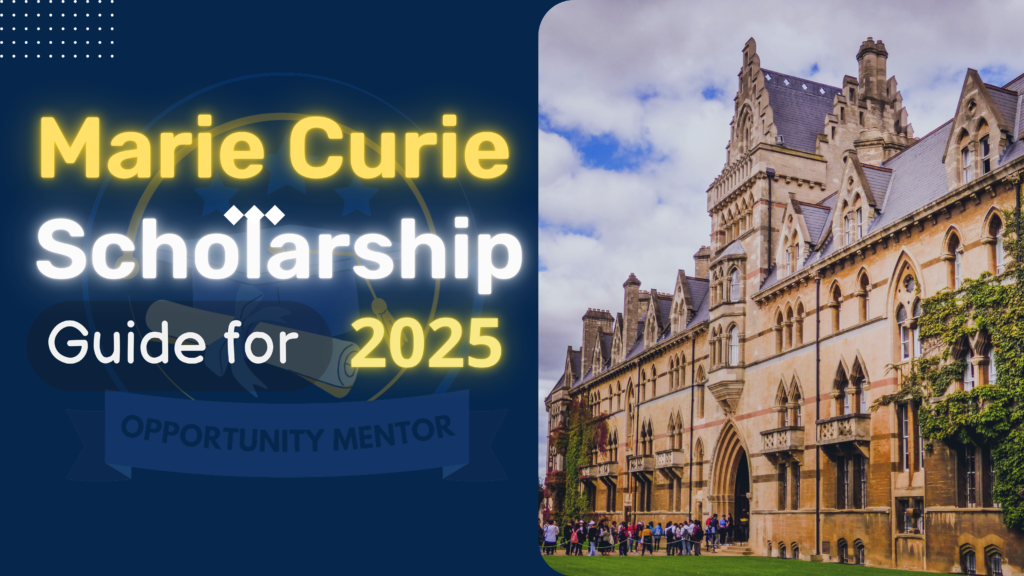Marie Curie Scholarship PhD 2025: Fully Funded Opportunity for Researchers

Image Source: Opportunity Mentor
Are you a researcher looking for exciting opportunities to grow your career? The Marie Curie Scholarship PhD 2025 is one of the best programs for international researchers. Funded by the European Union, this scholarship supports researchers at all levels. In this blog, we’ll break down everything you need to know about the Marie Curie Scholarship PhD 2025, including eligibility, benefits, application process, and deadlines.
What is the Marie Curie Scholarship PhD?
The Marie Curie Scholarship PhD is part of the European Union’s Marie Skłodowska-Curie Actions (MSCA). It supports researchers by funding innovative projects, encouraging global mobility, and fostering collaboration between universities and industries. If you’re looking for a chance to work on cutting-edge research, this scholarship is for you.
Key Benefits of the Marie Curie Scholarship PhD 2025
The Marie Curie Scholarship PhD is a fully funded opportunity, offering researchers a chance to excel in their fields. Here’s what you can expect:
- Attractive Salary: You’ll receive a living allowance, travel support, and additional funding if you have a family.
- Research Support: Costs for research activities, travel, and conferences are covered.
- Skill Development: Access to training, mentoring, and networking opportunities with top experts.
- International Experience: Relocate to a university or research center in Europe or beyond.
Who Can Apply for the Marie Curie Scholarship PhD?
The Marie Curie Scholarship PhD is open to researchers from all over the world. Here’s what you need to qualify:
- Education: A master’s degree or equivalent in your research field.
- Experience: Both beginners (less than four years of research experience) and experienced researchers can apply.
- Mobility: You must not have lived or worked in your chosen host country for more than 12 months in the past three years.
- Research Fit: Your project should align with the goals of the MSCA program.
Types of Marie Curie Scholarships
The Marie Curie Scholarship comes in different types to fit your needs:
- Individual Fellowships (IF): For researchers wanting to work abroad on their own projects.
- Innovative Training Networks (ITN): Doctoral training programs for new researchers.
- Research and Innovation Staff Exchange (RISE): Connects researchers across the world through staff exchanges.
- COFUND Programs: Supports regional and national postdoctoral programs.
How to Apply for the Marie Curie Scholarship PhD 2025
Applying for the Marie Curie Scholarship PhD is straightforward if you follow these steps:
- Find a Host Institution: Look for a university or research organization that fits your project.
- Write a Research Proposal: Clearly explain your project’s goals, methods, and expected results.
- Submit Online: Applications are submitted through the European Commission’s Funding & Tenders Portal.
- Prepare Your Documents: Include your CV, academic records, and recommendation letters.
- Keep Track of Deadlines: Each scholarship type has its own timeline, so check regularly.
Tips for a Successful Application
- Start Early: Don’t wait until the last minute to prepare your application.
- Be Clear: Write your proposal in simple language that anyone can understand.
- Show Impact: Explain how your research will make a difference.
- Collaborate: Work with your host institution to refine your application.
Final Thoughts
The Marie Curie Scholarship PhD 2025 is a golden opportunity for researchers who want to make an impact and advance their careers. With its generous funding and global reach, it’s a program you shouldn’t miss. Start planning your application now to take advantage of this incredible opportunity in 2025.
Share this guide with your fellow researchers to spread the word about this amazing scholarship!


